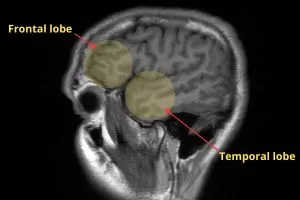You’ve probably heard the sad news: Bruce Willis has a neurodegenerative disease called frontotemporal dementia. But what exactly is frontotemporal dementia and why is it so terrible?
What is Frontotemporal Dementia?
Let’s talk about the name first: why “frontotemporal“? Because it affects two lobes of your brain: the frontal lobe and the temporal lobe.
These 2 lobes have several roles, and one of them is speaking. They are in charge of speaking. That’s why patients lose their ability to speak, which is what is happening to Bruce Willis.

And what about “dementia“? Dementia is a disorder where you progressively lose your brain skills. The most well-known dementia is Alzheimer, which causes memory loss.
But there are other types of dementia. Some of them cause tremors, hallucinations, a change in behavior… In the case of frontotemporal demential, you lose your ability to speak.
Unlike other kinds, frontotemporal dementia affects younger people, between 45 and 65 years old.
Most common symptoms in Frontotemporal Dementia
· Speaking
As we said, it’s very common that these patients lose their speech.
There are some different ways this can happen.
Some patients will try to say something but the words won’t come out, or they’ll say something different than they mean. For example, you want to say “give me my wallet” but instead you say “give me umbrella“. This experience is very frustrating for them, because they realize something is wrong. They are aware they can’t speak.
For another group of patients it’s different, though. They will speak a lot, very fast, with many words, but you won’t understand what they’re saying because they are using random words. These patients, however, won’t realize something is wrong, it’s like the words are leaking out of their brain. But they don’t seem to care.
· Change of behavior
Our frontal lobe also controls who we are, how we behave. Are you calm, responsible, punctual person? That information is stored in your frontal lobe. Are you a reckless, irresponsible mess? That, too, is stored in your frontal lobe.
For that reason, lesions of the frontal area can change your behavior, like frontotemporal dementia does.
Patients will start changing the way they behave, they’ll do things they didn’t do before. This drastic change may make them lose their job, for example, because they can’t avoid being late. Also they’ll have trouble communicating with other people, and in some cases they can turn somewhat aggressive.
· Impaired judgment and decision making
Our frontal lobe also has a lot to say in decision-making. Patients with this type of dementia tend to lose their normal judgement and they’ll make irrational decisions. In fact, it’s important to be aware of this and prevent them from making any harmful decisions.
How do you diagnose frontotemporal dementia?
It can be difficult to make a diagnosis because there are no specific tests.
Because of the strange symptoms we just described, it is usually mistaken for depression and other conditions (“he is starting to act weird”).
The way to diagnose this disorder is clinical. That means a neurologist must examine the patient and they will realize their symptoms look like those of frontotemporal dementia.
Is there a cure for it?
Unfortunately, no. There is some research going on but so far there is no treatment that will cure it or slow down the disease.
Leave a Reply